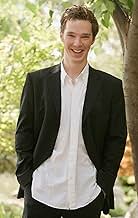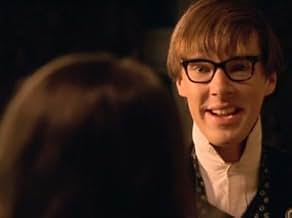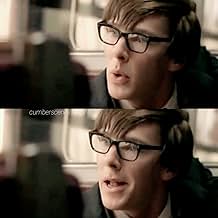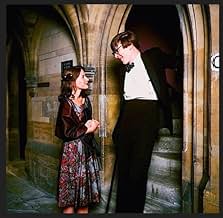CALIFICACIÓN DE IMDb
7.4/10
6.5 k
TU CALIFICACIÓN
Agrega una trama en tu idiomaTheoretical physicist/cosmologist Stephen Hawking's life and search for the beginning of time (1963-6).Theoretical physicist/cosmologist Stephen Hawking's life and search for the beginning of time (1963-6).Theoretical physicist/cosmologist Stephen Hawking's life and search for the beginning of time (1963-6).
- Nominada a2premios BAFTA
- 1 premio ganado y 3 nominaciones en total
Christian Rubeck
- Reporter
- (as Christian Pedersen)
- Dirección
- Guionista
- Todo el elenco y el equipo
- Producción, taquilla y más en IMDbPro
Opiniones destacadas
This drama concerns the early days in the life of Professor Stephen Hawkings. It tells the story of how he battles against MND and the mind set of famous Astronomer Fred Hoyles. It also tells of his relationship with soon to be first wife Jane and of the help given to him by Roger Penrose. Intersected within the story are snippets of Nobel prize winners Arno Penzias and Bob Wilson who's discovery of background radiation gave Stephen the "fossil" he would need to back up his theory.
Well written with good performances from the principle characters and set amongst the beautiful background of Cambridge Hawking is a surprisingly enjoyable hour and half.Although viewers not familiar with Hawkings or his work may find parts of the story a bit dull or confusing at times, ultimately it's an inspirational story (even with the artistic liberties) and a first class piece of drama.
Well written with good performances from the principle characters and set amongst the beautiful background of Cambridge Hawking is a surprisingly enjoyable hour and half.Although viewers not familiar with Hawkings or his work may find parts of the story a bit dull or confusing at times, ultimately it's an inspirational story (even with the artistic liberties) and a first class piece of drama.
The story of young Stephen Hawking's doctorate - starting with his 21st birthday in 1963, shortly after which he was diagnosed with motor neuron disease. The story continues with Hawking going to Cambridge to gain his doctorate, during which he fights to come to terms with his illness, grows ever-closer to young student Jane Wilde, and has to figure out something to write his thesis on... ...All this is told in flashback by Nobel Prize winners Bob Wilson and Arno Penzias (Tom Hodgkins and the marvellously irascible Michael Brandon, respectively), talking in 1978 about their discovery - the "3 degree hiss" of microwaves that is the echo of the Big Bang, which is the proof of Hawking's remarkable and evolutionary theory that he formulated for his doctorate thesis. Hawking didn't come up with the idea of the Big Bang, but he did show mathematically that the prevalent theory of the time - "Steady State", in which the universe was thought to be unchanging and to have existed forever - was wrong.
The performances are uniformly excellent, with Benedict Cumberbatch in the lead role making for a very convincing Hawking, capturing his brilliance and vulnerability well and portraying his physical deterioration sympathetically and convincingly. Other standout performances include Tom Ward as Roger Penrose, giving a superbly confident and energetic portrayal of the young professor who was Hawking's friend and mentor; John Sessions as Dennis Sciama, quiet and intense as Hawking's supervisor; Peter Firth as a triumphantly and permanently bad-tempered Fred Hoyle, with whom Hawking locked horns over their contradictory theories on the origin of the universe; and Lisa Dillon as Jane Wilde, who gave Hawking the strength to overcome his illness and realise his ideas.
Is this a sanitised or oversimplified story? Undoubtedly, but these things always are. That doesn't matter; the main characters are engaging, and the science is extremely well-handled. Hawking's "eureka" moment, when he literally falls off a train and desperately explains his idea to Penrose by drawing with chalk on the station platform, is powerful and moving and believable in equal measure. This drama shows that it's not just the great artists, the painters and composers and musicians, who have led remarkable and fascinating lives - science, in its own way, has just as much power to move and intrigue, and scientists have just as many great stories to tell.
The performances are uniformly excellent, with Benedict Cumberbatch in the lead role making for a very convincing Hawking, capturing his brilliance and vulnerability well and portraying his physical deterioration sympathetically and convincingly. Other standout performances include Tom Ward as Roger Penrose, giving a superbly confident and energetic portrayal of the young professor who was Hawking's friend and mentor; John Sessions as Dennis Sciama, quiet and intense as Hawking's supervisor; Peter Firth as a triumphantly and permanently bad-tempered Fred Hoyle, with whom Hawking locked horns over their contradictory theories on the origin of the universe; and Lisa Dillon as Jane Wilde, who gave Hawking the strength to overcome his illness and realise his ideas.
Is this a sanitised or oversimplified story? Undoubtedly, but these things always are. That doesn't matter; the main characters are engaging, and the science is extremely well-handled. Hawking's "eureka" moment, when he literally falls off a train and desperately explains his idea to Penrose by drawing with chalk on the station platform, is powerful and moving and believable in equal measure. This drama shows that it's not just the great artists, the painters and composers and musicians, who have led remarkable and fascinating lives - science, in its own way, has just as much power to move and intrigue, and scientists have just as many great stories to tell.
For those perhaps shy of this film thinking it may be grim or depressing -- it's quite the opposite. It's about Hawking in his early years -- getting his doctorate at Cambridge in the early 1960s, long before incapacitation set in.
This is Hawking in his green and wide-eyed youth, when he was just starting to wrap his mind around the amazing theories that changed theoretical physics and astrophysics. The film is joyful and uplifting and engaging and intriguing. It's not esoteric, and can certainly be followed by non-physicists such as myself.
And in case you've been under a rock lately, Benedict Cumberbatch is the finest young actor in the UK, and gives an unmissable performance, as usual.
Highly recommended for everyone!
This is Hawking in his green and wide-eyed youth, when he was just starting to wrap his mind around the amazing theories that changed theoretical physics and astrophysics. The film is joyful and uplifting and engaging and intriguing. It's not esoteric, and can certainly be followed by non-physicists such as myself.
And in case you've been under a rock lately, Benedict Cumberbatch is the finest young actor in the UK, and gives an unmissable performance, as usual.
Highly recommended for everyone!
In the 1960's, Stephen Hawking celebrates his 21st birthday at his parent's house before going out to his garden with a girl. As he lies looking up at the stars he realises he cannot move. After many tests, Stephen is diagnosed with motor neurone disease. Regardless he continues onto Cambridge to study physics. As his body starts to breakdown his mind shows no sign of stopping.
With the basic premise of mind prevailing over the failings of the body it is a surprise that no studio has had a crack at making a movie of the story prior to this (if they have I have not heard of it). I imagined that it would be turned into a cheap TVM for US daytime TV but happily the BBC got to it first. This film focuses on the Cambridge years of Hawking's life where he is diagnosed but fights on to formulate his theory of the big bang. This strand is very cleverly cut together with an interview with an interview (set in 1978) with Arno Penzias and Robert Wilson about their Nobel prize. The connection between the two wasn't known to me at the start but it does a very good job of showing the importance of both theirs and Hawking's work.
The interview section was very enjoyable simply because I didn't know where it was going and only a bit where the interviewer makes a big deal out of Penzias' German background for no reason struggles. The main thrust is a mixed bag but generally succeeds as it is an engaging human story even if you can't understand the science. Although the science is very simplified for the audience, what the film does do is translate the energy and excitement behind discovery and the mind. Not all of it works of course and there are some scenes that are distinctly weak. At the start the film states that some scenes are fictional and it is some of the weaker ones that are - I found it hard to accept the geeky Hawking chatting up a girl by talking physics to her; likewise some other scenes lack credence due to their setting and dialogue.
Cumberbatch does very well with his portrayal of Hawking considering he had no footage to work with and only was able to meet the man himself once before shooting once during it. He manages to look a little like Hawking and has got his smile down well (the smile that Hawking still has). His weak moments come when the dialogue gets a bit silly but he manages to convey the excitement of the big bang revelation as well remaining a likeable guy who's mental ability never alienated me. The support cast is mostly quite good, there is a minor straight role for John Sessions who does well, as do the guys who play Wilson and Penzias. Dillon's Jane is a bit weak and her fake tan leaves a white mark at her hairline that I found rather distracting (how shallow am I?!).
Overall this is an enjoyable little film despite it's weaknesses in the script and in the delivery at times. The basic human story is rather inspiring (even if few of us can rely on my mind to quite Hawking's degree) and the film manages to make the science rather exciting even if it fails to really explain it on much more than a childishly simplified level.
With the basic premise of mind prevailing over the failings of the body it is a surprise that no studio has had a crack at making a movie of the story prior to this (if they have I have not heard of it). I imagined that it would be turned into a cheap TVM for US daytime TV but happily the BBC got to it first. This film focuses on the Cambridge years of Hawking's life where he is diagnosed but fights on to formulate his theory of the big bang. This strand is very cleverly cut together with an interview with an interview (set in 1978) with Arno Penzias and Robert Wilson about their Nobel prize. The connection between the two wasn't known to me at the start but it does a very good job of showing the importance of both theirs and Hawking's work.
The interview section was very enjoyable simply because I didn't know where it was going and only a bit where the interviewer makes a big deal out of Penzias' German background for no reason struggles. The main thrust is a mixed bag but generally succeeds as it is an engaging human story even if you can't understand the science. Although the science is very simplified for the audience, what the film does do is translate the energy and excitement behind discovery and the mind. Not all of it works of course and there are some scenes that are distinctly weak. At the start the film states that some scenes are fictional and it is some of the weaker ones that are - I found it hard to accept the geeky Hawking chatting up a girl by talking physics to her; likewise some other scenes lack credence due to their setting and dialogue.
Cumberbatch does very well with his portrayal of Hawking considering he had no footage to work with and only was able to meet the man himself once before shooting once during it. He manages to look a little like Hawking and has got his smile down well (the smile that Hawking still has). His weak moments come when the dialogue gets a bit silly but he manages to convey the excitement of the big bang revelation as well remaining a likeable guy who's mental ability never alienated me. The support cast is mostly quite good, there is a minor straight role for John Sessions who does well, as do the guys who play Wilson and Penzias. Dillon's Jane is a bit weak and her fake tan leaves a white mark at her hairline that I found rather distracting (how shallow am I?!).
Overall this is an enjoyable little film despite it's weaknesses in the script and in the delivery at times. The basic human story is rather inspiring (even if few of us can rely on my mind to quite Hawking's degree) and the film manages to make the science rather exciting even if it fails to really explain it on much more than a childishly simplified level.
I didn't expect to enjoy this film. I did, and I'm still thinking about it. It was moving, emotional, sensitive and brilliantly crafted.
I know little about Stephen Hawking, and the subjects of physics and cosmology are completely over my head. I think it is a testament to the script and performances that this film made such subject matter appealing and engaging. Don't think the film is for science geeks - it is an uplifting story full of courage and hope and is thoroughly rewarding.
Benedict Cumberbatch is quite simply brilliant in this film. He is without doubt one of the finest actors in Britain.
I know little about Stephen Hawking, and the subjects of physics and cosmology are completely over my head. I think it is a testament to the script and performances that this film made such subject matter appealing and engaging. Don't think the film is for science geeks - it is an uplifting story full of courage and hope and is thoroughly rewarding.
Benedict Cumberbatch is quite simply brilliant in this film. He is without doubt one of the finest actors in Britain.
¿Sabías que…?
- TriviaBenedict Cumberbatch is the first actor ever to play Stephen Hawking on screen in this film. He is also good friends with Eddie Redmayne, who played Hawking in the biopic La teoría del todo (2014).
- ErroresStephen Hawking, on his 21st Birthday, mentions the Beatles song "Please Please Me." This song was not released until the 11th January 1963, two days after Hawking's 21st Birthday.
- Citas
Stephen Hawking: We are very very small. But we are profoundly capable of very very big things.
- ConexionesFeatured in Hawking (2013)
Selecciones populares
Inicia sesión para calificar y agrega a la lista de videos para obtener recomendaciones personalizadas
Detalles
- Fecha de lanzamiento
- País de origen
- Sitio oficial
- Idioma
- También se conoce como
- Гокінґ
- Locaciones de filmación
- Productora
- Ver más créditos de la compañía en IMDbPro
Contribuir a esta página
Sugiere una edición o agrega el contenido que falta
































